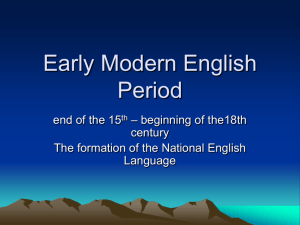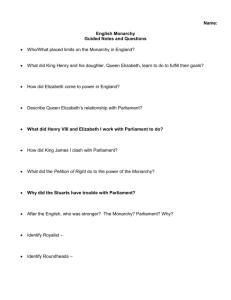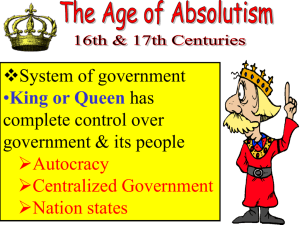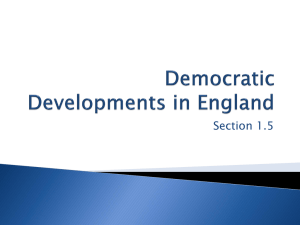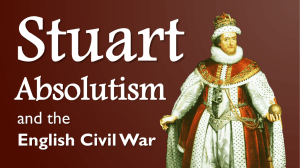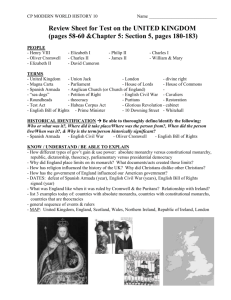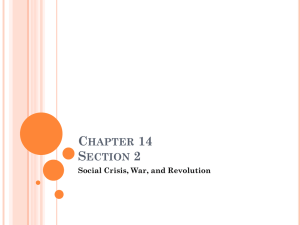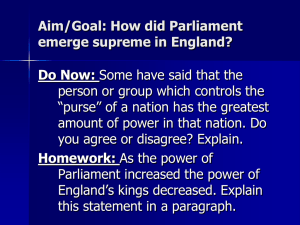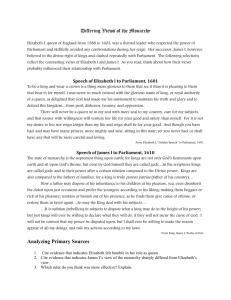Name: Date: :____ History of the English Monarchy Objective
advertisement
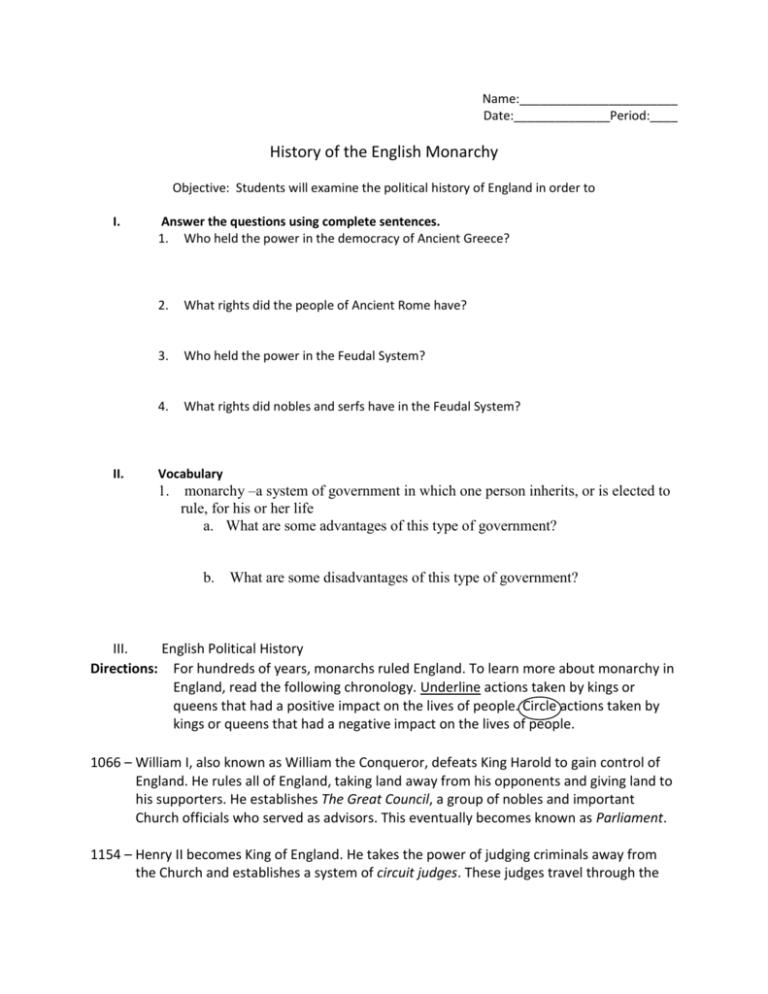
Name:_______________________ Date:______________Period:____ History of the English Monarchy Objective: Students will examine the political history of England in order to I. II. Answer the questions using complete sentences. 1. Who held the power in the democracy of Ancient Greece? 2. What rights did the people of Ancient Rome have? 3. Who held the power in the Feudal System? 4. What rights did nobles and serfs have in the Feudal System? Vocabulary 1. monarchy –a system of government in which one person inherits, or is elected to rule, for his or her life a. What are some advantages of this type of government? b. What are some disadvantages of this type of government? III. English Political History Directions: For hundreds of years, monarchs ruled England. To learn more about monarchy in England, read the following chronology. Underline actions taken by kings or queens that had a positive impact on the lives of people. Circle actions taken by kings or queens that had a negative impact on the lives of people. 1066 – William I, also known as William the Conqueror, defeats King Harold to gain control of England. He rules all of England, taking land away from his opponents and giving land to his supporters. He establishes The Great Council, a group of nobles and important Church officials who served as advisors. This eventually becomes known as Parliament. 1154 – Henry II becomes King of England. He takes the power of judging criminals away from the Church and establishes a system of circuit judges. These judges travel through the kingdom deciding criminal cases with the king’s authority. Henry II also introduces the idea of using juries in trials. 1199 – John becomes King of England. He fights and loses a war against King Phillip of France. To pay for this war, he taxes his citizens heavily. He threatens to take away their land if they do not pay the high taxes. 1215 – John is forced to sign the Magna Carta, or “Great Charter.” This document states that the king and the government are bound to follow the same laws as the citizens of England. It also includes the idea of due process, stating that a person cannot be imprisoned unless the law is followed. 1485 – Henry VII becomes King of England and establishes the royal council, which follows the orders of the king in making laws and judging criminal cases. Juries are no longer used. 1534 – King Henry VIII disagrees with the Roman Catholic Church over who controls the Church in his country. He has Parliament pass the Act of Supremacy, which makes the king the head of the Church of England. He makes Protestantism the official religion of England. 1553 – Mary I becomes Queen of England. She is a devout Roman Catholic, and kills or exiles many Protestants. 1558 – Elizabeth I becomes Queen of England. She restores Protestantism as the official religion of England. She makes decisions that maintain peace within England, as well as between England and other European countries. 1603 – James I becomes King of England. He believes in the divine right of kings. This means that he believes God has given him absolute power over all citizens of England. He does not believe he has to follow laws that govern his country. 1625 – Charles I becomes King of England. Charles also believes in divine right. He decides to rule without Parliament from 1629-1640 and taxes the citizens of England illegally. 1640 – Charles I does not have enough money to fight a war, so he calls Parliament to help him raise the money. They attempt to pass laws that limit the king’s power. 1642 – The English Civil War begins, with the armies of Charles I fighting the armies of Parliament, led by Oliver Cromwell. 1649 – Parliament defeats and executes Charles I. Cromwell becomes the head of the Commonwealth of England. 1653 – Cromwell is upset by Parliament’s failure to pass reforms. He dismisses Parliament, ends the Commonwealth, and takes the title Lord Protector of England. He passes laws that limit freedom of speech, strengthen the military, and establish moral standards. 1660 – After Cromwell’s death and his son’s failure as a ruler, the monarchy is restored. Charles II becomes king of England. He creates a council of five advisors who help him work with Parliament. 1673 – Parliament passes the Test Act, allowing only Protestants to hold important jobs. 1685 – James II becomes king of England. He ignores the Test Act and gives important jobs to Roman Catholics. He grants religious freedom to all citizens. 1688- A group of nobles offers the throne to James’ daughter Mary, a Protestant. King James and his wife flee to France. 1689 – Parliament makes Mary and her husband William Queen and King of England in the Glorious Revolution. 1689 – Parliament passes the English Bill of Rights. It states that laws made by Parliament cannot be overthrown by the monarchy. It also states that elections and debates cannot be interfered with by the monarchy. IV. Answer the questions using complete sentences. Use support from the text in your answer. 1. Do the advantages of monarchy ever outweigh its disadvantages? 2. Prior to 1689, who held the greatest amount of political power in England? 3. As of 1689, who held the greatest amount of political power in England? 4. Why did lords struggle to limit the power of monarchs in England?
